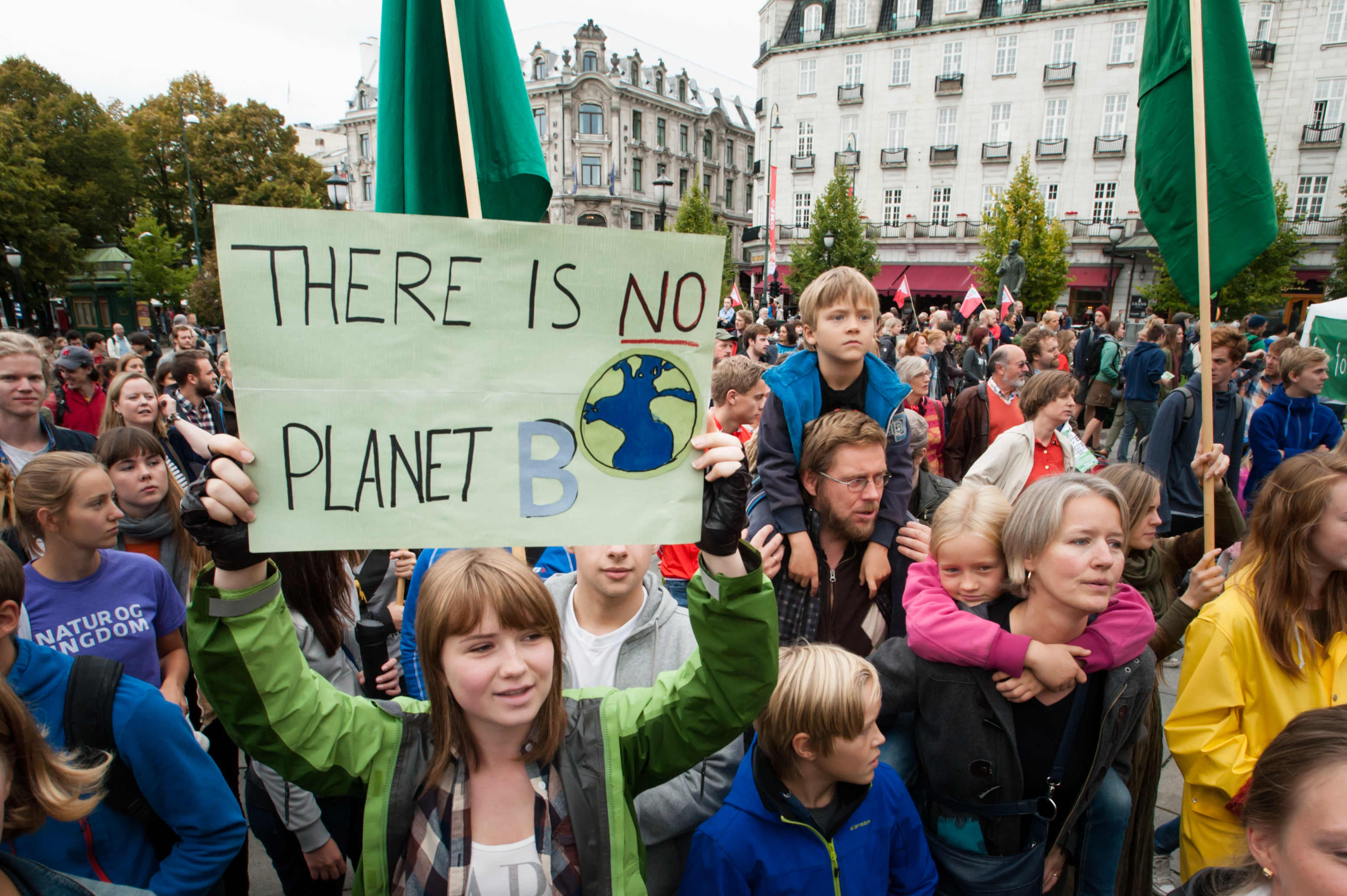
Case Study: Helping a client conquer doubts and determine next steps after post-secondary
October 7, 2019
Client Side: What I learned from quitting my job to study cannabis in my 30s
October 7, 2019Oslo, Norway - September 21, 2014: A sign reads, "There Is No Planet B", as parents carry children among thousands marching through central Oslo, Norway, to support action on global climate change, September 21, 2014. According to organizers of "The People's Climate March", the Oslo demonstration was one of 2,808 solidarity events in 166 countries, which they claim was "the largest climate march in history".
Helping young people think critically about how employment and the environment intersect can shift their sense of fear to a feeling of empowerment
Stefania Maggi

At the same time, children suffer from a wide range of mental-health problems. Young people are struggling to find their place in a world with such an uncertain future. They feel powerless in the face of the climate change giant, which they know they must fight, but feel is too big to be defeated. They feel vulnerable, ill-equipped and under pressure. This is not the doing of climate change. This is our own doing.
Our greatest resource in battling climate change
We do this to our children because we fail to see their resilience and their limitless potential. We marginalize them to the fringes of decision-making by stripping them of their greatest assets: their propensity for big dreams, their innate ability to think outside of the box and their calling to take on any challenge, the bigger the better.
We don’t honour and nurture young people for what they have to offer to the collective well-being, to the future of our planet. Our children are the greatest resource we have to make things right for the health of this planet and all of its inhabitants. Now is the time to enable and empower them to take charge of their own futures for the good of all living beings.
Career and leadership development could be the answer in preparing the workforce of tomorrow to take on and beat this tremendous challenge by shifting the sense of fear and hopelessness to one of empowerment and purpose. Enough with messages of despair that paralyze us. Let’s do what we do best as educators and career coaches. Let’s equip young people to find their purpose and help make this planet healthier through career and leadership guidance and education.

iStock
Thinking critically about jobs and the environment
This is the spirit that motivated me to create the 100 Jobs Challenge! a program designed to promote early career and leadership development and climate change awareness.
The program challenges participants (a group of 15-20 young people between the ages of 12 and 18) to identify 100 present and future jobs they believe can help us mitigate and adapt to climate change. Then, they work backward to determine the skills/education required to secure these roles. Facilitators provide youth participants with context and guidance, encouraging youth to reflect more deeply on the contribution of their career of choice to the collective well-being. However, youth take the lead in the process of seeking information, thinking critically and identifying relevant results throughout the five-day workshop.
The purpose of the 100 Jobs Challenge! is to prepare the workforce of tomorrow to think more deeply and critically about jobs and the environment. It aims to increase knowledge, awareness and competence about how each career choice one makes can play a direct or indirect role in restoring the health of this planet. The program also aims to promote the development of socio-emotional skills, resilience and social responsibility in youth in the early stages of their career and leadership development.
The 100 Jobs Challenge
Who: Young people 12 years of age and older. Groups can be of mixed ages to facilitate mutual socio-emotional learning and leadership skills.
When: Originally developed to fit the format of summer camps and winter breaks, the 100JC can be adapted into after-school programs, weekend retreats and other kinds of events.
Where: Anywhere participants can both collaborate and spend time by themselves to complete individual activities. Participants should have access to internet and be able to conduct research online individually or in small groups.
How: The 100JC is co-ordinated by three certified trainers: a lead facilitator and two youth facilitators.
A unique approach
This approach stands out from mainstream approaches to career and leadership development in several ways.
- It is timely, relevant and interdisciplinary. Because the program is embedded in the context of a real-life problem, participants feel that what they are learning is relevant to their lives. Also, rather than focusing on specific disciplines that may not be of interest to all participants, the activity challenges students to identify present and future jobs related to the theme and then work backward to determine the skills/education required.
- It promotes self-directed learning and problem-solving. Facilitators provide youth participants with context and guidance, but youth take the lead in seeking information, thinking critically and identifying relevant results. The target of identifying 100 jobs, 20 of which have to be “invented” for the future, motivates participants to engage in problem-solving without the fear of being “wrong.” Youth can follow their curiosity and identify careers that interest them personally. This encourages entrepreneurial skills-building and out-of-the-box approaches to career and leadership development.
- It fosters a culture of collaboration. The format of the program is highly interactive, with many opportunities for youth to work together and discuss in groups. The facilitators act as partners in learning rather than traditional teachers and create an environment of collaboration and mutual respect where diverse perspectives are valued. This format allows for practising key foundational pre-employment and employment skills such as the ability to work in teams and respect for diversity and inclusion.
- It is reflective. Throughout the program, there are opportunities for young people to pause and reflect deeply on their interests, inclinations, strengths, aspirations and goals. These deliberate moments are designed to give participants a chance to practice and consolidate important pre-employment and employment socio-emotional skills such as self-efficacy, self-awareness, independence and self-reflection.
- It is evergreen. Unlike many career resources that are in constant need of updating, the 100 Jobs Challenge! provides a guided process for youth to identify current jobs and skills requirements. Furthermore, it challenges youth to be forward-looking and imagine certain jobs/careers that may emerge in the future, helping them to realize the importance of life-long learning for the changing world of work.
- It integrates technology and multimedia approaches. During the workshops, youth learn research skills using the internet and other available sources of information. They can also stay connected with facilitators and their program peers via social media during and after the program. The use of technology and multimedia strategies to facilitate learning enhances best practices in pedagogical science while keeping the learner engaged.
Read more about children and youth’s career development on CERIC’s CareerWise website
To put youth on path to well-being, we need to talk to them about careers
Three people your student should meet before graduating high school
5 ways to talk with young children about work and careers
Skills to succeed in the future of work
In my experience working with youth, I have come to understand how fundamental it is for an impactful career-coaching program to address developmental needs first and foremost. Career professionals working with youth need to have space and time built into their services to support the development of pre-employment skills that are so critical to a successful life-long career trajectory. A career professional is successful when they know that their young clients have learned to search within themselves, as opposed to in a list of job descriptions and salary scales, to discover their career aspirations.
In other words, the focus of career services for young people should be less on matching interests to specific job titles and more on the acquisition and consolidation of pre-employability skills – that is, socio-emotional skills – which young people can carry with them from one job to the next and use to adapt to the rapid changes of today’s world of work. It is up to the career professional to adjust their programs and services to meet the socio-emotional needs of their clients and to offer opportunity for growth and positive development.
The Organization for Economic and Co-operation Development report on socio-emotional skills and career development (Chernyshenko, Kankaraš & Drasgow, 2018) is an excellent resource providing the knowledge base for career guidance and coaches working with youth who want to integrate key socio-emotional learning in their programs.
In the end, it doesn’t matter what careers our students choose. What matters is what they know about the impact that their careers can have, one way or another, on the health of our planet. What matters is how that knowledge will influence their actions in their personal and professional lives. The choice remains theirs to make, and it should not be any other way.
Stefania Maggi is the Founder & CEO of Be Your Best Self, Inc. (BYBS), a social enterprise created to empower young people to build their future with purpose, self-awareness, resilience and social responsibility. Maggi is also a university professor, researcher, child rights advocate and sci-fi author.
References
Chernyshenko, O.S., Kankaraš, M., & Drasgow, F. (2018) Social and emotional skills for student success and wellbeing: conceptual framework for the OECD study on social and emotional skills. OECD Education Working Paper No. 173.

